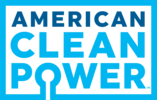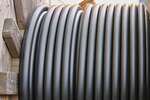News Release from American Clean Power Association (ACP)
Wind Industry Profile of
08/10/2009
USA - Fighting against the impact of economic crisis, the U.S. wind energy industry installs 1,200 MW in second quarter
The U.S. wind energy industry installed 1,210 megawatts (MW) of new power generating capacity in the second quarter, bringing the total added this year to just over 4,000 MW – an amount larger than the 2,900 MW added in the first six months of 2008, the American Wind Energy Association (AWEA) said today in its second quarter (Q2) market report.
While the number of completed wind farm installations was solid, AWEA said it is seeing a reduced number of orders and lower level of activity in manufacturing of wind turbines and their components, a development it termed troubling in view of the fact that the U.S. industry was previously on track for much larger growth and the global wind power industry is continuing to expand.
“The numbers are in, and while they show the industry has been swimming upstream, adding some 4,000 MW over the past six months, the fact is that we could be delivering so much more,” said AWEA CEO Denise Bode. “Our challenge now is to seize the historic opportunity before us to unleash this entrepreneurial force and build up an entire new industry here in the U.S. that will create jobs, avoid carbon, and strengthen our energy security. To achieve that, Congress and the Administration must pass a national Renewable Electricity Standard (RES) with strong early targets.”
During the second quarter, the U.S. wind energy industry completed a total of 1,210 MW in 10 states, enough to power the equivalent of about 350,000 homes. These new installations nudge total U.S. wind power generating capacity to 29,440 MW, according to the report. The U.S. wind power generating fleet now offsets an average of 54 million tons of carbon annually, reducing carbon emissions from the electricity sector by 2% or the equivalent of taking 9 million cars off the road.
The state posting the fastest growth in the 2nd quarter was Missouri, where wind power installations expanded by 90%.
“Missourians know that in order for us to grow our state’s economy and create the jobs of the twenty-first century, we must embrace new technology and advances like the ones presented to us through renewable wind energy,” said Missouri Governor Jay Nixon. “So I’m proud that the American Wind Energy Association’s quarterly report shows no state has capitalized on these growth opportunities more aggressively over the last three months than Missouri has. But that isn’t enough. Missouri will continue to look for ways to enhance our energy supply and independence by using common-sense and cost effective expansions of clean, renewable wind power.” Pennsylvania and South Dakota ranked second and third in terms of growth rate in the second quarter, expanding by 28% and 21% respectively.
For more information please contact Trevor Sievert at ts@windfair.net
While the number of completed wind farm installations was solid, AWEA said it is seeing a reduced number of orders and lower level of activity in manufacturing of wind turbines and their components, a development it termed troubling in view of the fact that the U.S. industry was previously on track for much larger growth and the global wind power industry is continuing to expand.
“The numbers are in, and while they show the industry has been swimming upstream, adding some 4,000 MW over the past six months, the fact is that we could be delivering so much more,” said AWEA CEO Denise Bode. “Our challenge now is to seize the historic opportunity before us to unleash this entrepreneurial force and build up an entire new industry here in the U.S. that will create jobs, avoid carbon, and strengthen our energy security. To achieve that, Congress and the Administration must pass a national Renewable Electricity Standard (RES) with strong early targets.”
During the second quarter, the U.S. wind energy industry completed a total of 1,210 MW in 10 states, enough to power the equivalent of about 350,000 homes. These new installations nudge total U.S. wind power generating capacity to 29,440 MW, according to the report. The U.S. wind power generating fleet now offsets an average of 54 million tons of carbon annually, reducing carbon emissions from the electricity sector by 2% or the equivalent of taking 9 million cars off the road.
The state posting the fastest growth in the 2nd quarter was Missouri, where wind power installations expanded by 90%.
“Missourians know that in order for us to grow our state’s economy and create the jobs of the twenty-first century, we must embrace new technology and advances like the ones presented to us through renewable wind energy,” said Missouri Governor Jay Nixon. “So I’m proud that the American Wind Energy Association’s quarterly report shows no state has capitalized on these growth opportunities more aggressively over the last three months than Missouri has. But that isn’t enough. Missouri will continue to look for ways to enhance our energy supply and independence by using common-sense and cost effective expansions of clean, renewable wind power.” Pennsylvania and South Dakota ranked second and third in terms of growth rate in the second quarter, expanding by 28% and 21% respectively.
For more information please contact Trevor Sievert at ts@windfair.net
- Source:
- American Wind Energy Association
- Author:
- Edited by Trevor Sievert, Online Editorial Journalist / Author: AWEA Staff
- Email:
- info@awea.org
- Link:
- www.awea.org/...
- Keywords:
- AWEA, wind energy, wind farm, renewable energy, wind power, wind turbine, rotorblade, offshore, onshore



























